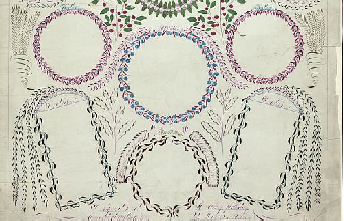Collaborating across the Library to explore, evaluate, and pilot support for digital scholarship.
The research landscape of available resources, tools, and methodologies has been significantly changed by digital technologies. Librarians and curators who manage and provide access to collections, with the researchers who use collections, need guidance to need to align skills and expectations to take advantage of the opportunities of digital scholarship. The Labs team has evaluated needs at the Library of Congress and approaches for support of digital scholarship at other organizations while also working one-on-one with researchers from the John W. Kluge Center.
Introduction to Digital Scholarship
- Guide to Digital Scholarship at the Library of Congress. This Library of Congress research guide outlines variou ways of accessing the Library's digital materials.
- Digital Scholarship 101: Six tools to get you started (2018) by Eileen Jakeway. As a 2018 Junior Fellow, Eileen worked with fellows at the John W. Kluge Center to create a workshop and supporting resources for researchers interested in digital scholarship methodologies. This research guide is a way to get started with 6 approachable tool tutorials
- Digital Scholarship Resource Guide (2017) by Samantha Herron. As a 2017 Junior Fellow with Labs, Sam created this primer on understanding digital scholarship. This guide is full of example projects, methodologies, and further resources to get readers up to speed quickly.
Program Reports and Recommendations
- Recommendations for a Digital Scholarship Lab at the Library of Congress (2016) by Michelle Gallinger and Dan Chudnov. A study of how libraries and other research centers have developed services that use computational analysis, design, and engagement to enable new kinds of discovery and outreach. This work resulted in concrete recommendations to the Library on how to approach setting up a Lab at the Library of Congress.
Trainings Offered
- Text Mining with HathiTrust Workshop: Empowering Librarians to Support Digital Scholars External (2018) This workshop introduced attendees to text analysis research and the common methods and tools used in this emerging area of scholarship, with particular attention to the HathiTrust Research Center. It provided a framework for how the library can support text data mining, as well as transferable skills useful for many other areas of digital scholarly inquiry. Topics included: intro to gathering, managing, analyzing, and visualizing textual data; hands-on experience with text analysis tools, including the HTRC's off-the-shelf algorithms, datasets, and using the command line to run basic text analysis processes. Contact htrc_workshop@library.illinois.edu if you have questions.
- Hack-to-Learn (2017) A learning hackathon in partnership with George Mason and George Washington University Libraries to pair librarians with programmers to use collection data to test tools and create new entry points to collections. Over the two days, attendees used low or no-cost computational tools to explore four library collection as data sets.
- Software Carpentry (2017) The Labs team hosted a Software Carpentry workshop with instructors Mark Laufersweiler and Mark Stacey of the University of Oklahoma, inviting staff from the Library, the DC Public Library and federal libraries for hands-on learning in the programming language Python, the version-control software Git, and the command-line interface Bash.
Demonstration Projects
- RSHHGG Lab (2018) The RSHHGG Lab is an interactive online index of over 90 years of the Revue de la Société Haïtienne d’Histoire, de Géographie et de Géologie, the official publication of Haiti’s oldest intellectual society that is still active today. The publication is not widely available, so by indexing the contents of the journal, the site aims to increase the impact of this important publication by facilitating the work of scholars of Haiti in the US, Haiti, and beyond. This site was created by Chelsea Stieber while she was on a yearlong fellowship at the John W. Kluge Center at the Library of Congress where she had access to the RSHHGG journal. Stieber consulted with the Labs team and Laura Wrubel, visiting software development librarian from GW Libraries, to create this site. Stieber is an Assistant Professor of French and Francophone Studies at Catholic University of America in Washington, DC. In 2018, she completed a yearlong fellowship at the John W. Kluge center at the Library of Congress.
- Mapping Spanish Music (2017) Kluge Fellow Ascensión Mazuela-Anguita wanted to expand access to the Lomax Family Collection in the American Folklife Center that explores traditional Spanish music and connect songs recorded by Lomax in Spain to traditional music collections in Barcelona. The majority of her time was spent on researching, annotating, and cataloging information. She also wanted to create a visual representation of what she was finding. Specifically, Mazuela-Anguita wanted to use Labs staff connected her to the Story Maps tool and she was able to develop and publish an online visualization of her work.


